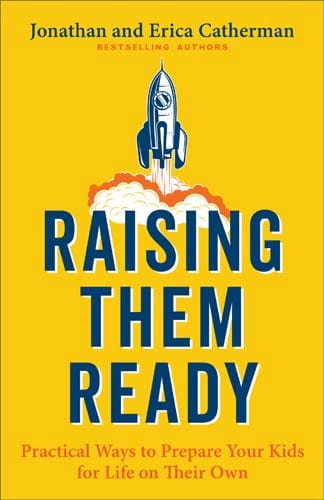Raising Them Ready: Preparing kids to handle life on their own
When bestselling authors and co-parents Erica and Jonathan Catherman decided to write their next parenting book, they asked themselves a question: “How well had we done to prepare our “adulting” kids to leave home?” Knowing other parents were likely asking themselves the same question, they came up with “Raising Them Ready,” a guide for parents on real-world life skills kids should know before flying solo.

How soon should we begin preparing our children to handle life on their own?
It’s never too early (or too late) to prepare your kids to handle the demands of life. As young as 2 years old, children really should start learning and practicing how to do life together with others and on their own. We have a name for the process of kids learning to handle the age-and-ability appropriate demands of life. It’s called the Skillset Maturity Continuum.
As children mature through the four stages, they learn more than 300 combined skillsets and toolsets on a “Launch List” (see sidebar). By teaching children to be life ready a little at a time, over time, you are helping them build a solid foundation of self-efficacy based on confidence, capabilities and kindness.
Whereas parents who find themselves short on time before their child “launches” in life and try pushing their kids though a crash course in Adulting 101 are likely to feel the regret of waiting to the last-minute. Yet how does the saying go? Better late than never.
We often do things for our children to ease difficulty or keep them from struggling. Is this actually a disservice?
Yes and no. If on occasion you do things for your kids because you are showing them love and kindness, then yes. But if by hovering around, always ready to step in to “deal” with the situation, you are indulging your child. Then, no. Repeatedly indulging a child in this way can keep them from gaining the practical experience and depth of independence they need to succeed, both in the moment and in the future.
An indulgent parent regularly does for their children what they could and should learn to do for themselves. To quote a school principal friend of ours, “Hope those parents have a basement in their home. Because their kid is never going to leave.” And that would be a true disservice to both the child and their parents.
How do we teach our children to be resilient in the face of failure?
One of the most effective ways to teach children to be resilient is to help them build their self-efficacy. Think of self-efficacy as your kid’s no-parent-needed belief in their own capabilities to control their personal performances and, in turn, the events that affect their life.
It’s important to remember that self-efficacy and self-esteem are not the same thing. Yes, it’s important that your child builds a strong sense of self-esteem, but they’ll need much more than good feelings to truly make it today.
This means parents need to stop trying to pump up their child’s self-esteem by telling them they are good at everything. They’re not. They do not deserve a fancy trophy for simply participating. Any message we give our kids other than some people excel because they are better prepared—more willing and able—is an inaccurate and potentially dangerous lie.
Instead of placebo trophies for everyone, give your kids words of encouragement, high-fives and hugs when they do their best. Doing their best and practicing ways to improve will build both their self-efficacy and resiliency. When you do stop for ice cream after the game, recital, concert, race or performance, make it about a fun family tradition and not as a reward.
Believe it or not, your child’s ego can handle not always winning and one day they will thank you for teaching them to be resilient. Kids who develop a can-do, self-efficacy, growth mindset from supportive parents are the kind of kids who, after not always winning, still stand with their feet on solid ground and their head in the clouds.
Is there a secret ingredient to a child’s success?
Yes, there absolutely is a secret ingredient to your child’s current and future success. It’s a major player within the environment in which we nurture our children, and it outperforms all other factors. The most powerful influence on a child developing the kind of positive mindset and confident willingness to try new things is . . . YOU.
That’s right; it’s you. The parents. Specifically, how you parent, commonly and professionally referred to as your parenting style. There is no doubt, when it comes to which parenting style benefits our children most, authoritative is the winner.
If you want to learn more about which parenting style you practice, a free Parenting Styles Assessment is available at www.TheCathermans.com.
Age-appropriate life skills from Raising Them Ready’s “Launch List”
Ages 2-8
- Assist with making bed
- Brush teeth
- Clean light spills
- Feed family pet
- Know parent’s phone number
- Learn to swim
- Pick up and put away toys
- Put dirty clothes in hamper
- Say “yes please,” “thank you” and “no, thank you”
- Wash hands
Ages 9-11
- Assist with meal preparations
- Change bed sheets
- Clean bathroom sink, tub and toilet
- Empty trash and recycling
- Give confident handshake with eye contact
- Make bed
- Make lunch
- Manage personal hygiene
- Select day’s clothes without assistance
- Vacuum carpet floors
- Everything on the Life Skills list for kids ages 2-8
Ages 12-15
- Apply deodorant or antiperspirant, daily
- Clean clogged sink, tub or toilet drain
- Cook dinner for themselves and others
- Iron clothes
- Memorize social security number
- Open bank account
- Open door for another person
- Read a tape measure
- Wash and dry clothes independently
- Wrap a gift
- Everything on the Life Skills list for kids ages 2-11
Ages 16-21+
- Ask for professional reference
- Change a flat tire
- Check and reset home’s circuit breaker
- Fill out a job application
- Jump-start a dead car battery
- Make personal appointments
- Manage personal finances
- Perform basic automotive upkeep
- Read and understand terms of rental or lease agreement
- Work part-time
- Everything on the Life Skills list for kids ages 2-15
*Photos provided by Erica and Jonathan Catherman | Originally published in October 2023 of Tampa Bay Parenting Magazine.


